Are dogs carnivores or omnivores?
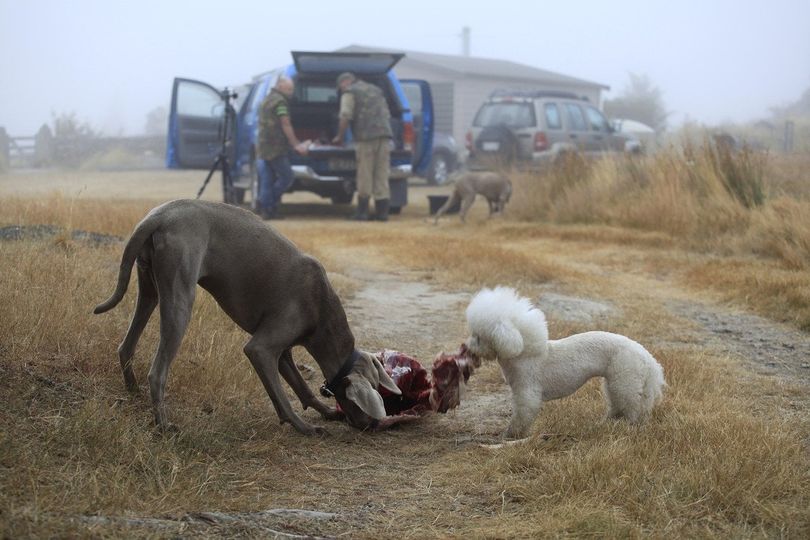
🔗 Content may be shared with attribution to Pet Food Reviews (Australia)
Is a dog a carnivore or omnivore? What do you think?
It’s a debate which has become very muddy over the years, unfortunately in part from corporate-led marketing (aka “science”) with a conflict of interest (or in layman’s terms – driven by profit, not your dog).
When a dog’s digestive system is closer to that of an obligate carnivore cat, and molecular biology proves cats and dogs have a much more recent ancestor than us and them, it makes you wonder why we’re so readily convinced our domestic dogs are omnivores like us.
It certainly serves pet food companies well if we class dogs as omnivores. It allows dog foods to be made of cheaper ingredients, which in turn generates far greater profits.
In this article we’ll look at some fairly simple and logical facts which tell us what the biological make-up of our dogs really is.
As a fun exercise – write down on a piece of paper (or back of your mind) whether you think a dog is a carnivore or omnivore, and let’s see if you’re right.
Carnivore vs omnivore – what is the real question?
I was prompted to write this article having read a message from a person dictating I had no credibility to review pet foods because I refer to dogs as carnivores (or “essentially carnivorous”).
The person, who happened to be a professional in the veterinary industry, stated with utter certainty that a dog was an omnivore in the same manner a flat-earther would say “The Earth is flat”.
So, are dogs carnivores or omnivores?
Let’s discuss…
There’s some very straightforward reasoning to help you decide for yourself whether your pet dog is an omnivore (like us) or a carnivore (like a cat, fox, or wolf). I’ll add some facts in the FAQ at the end, but will skirt over them where necessary as we go along.
Firstly, and most importantly, “omnivore” and “carnivore” aren’t buckets, more a sliding scale of what our anatomy dictates. If you consider us as omnivores, and cats as obligate carnivores (a cat depends entirely on meat for food, nutrition, and survival), where on the scale would you put a dog?
You see, the question isn’t “is a dog a carnivore or omnivore?”. The real question is “where on the omnivore to carnivore scale is a dog?”
I knocked up an illustration in Paint for us to ponder:
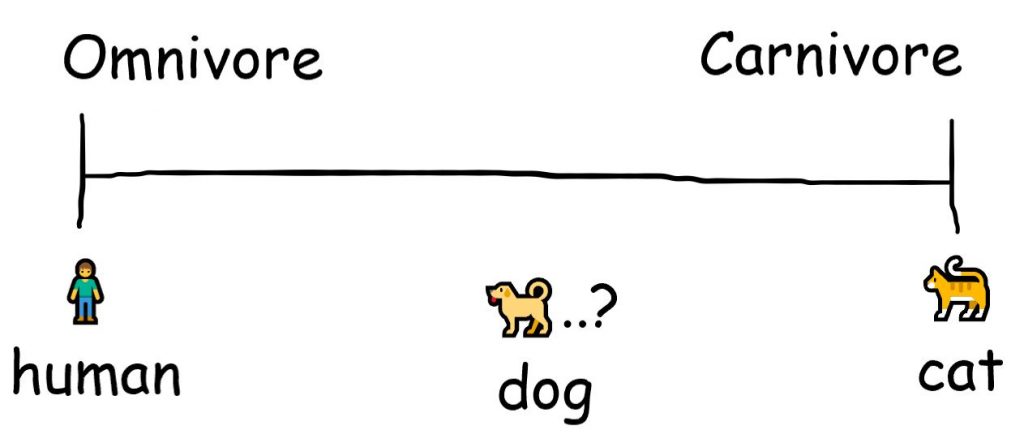
It seems clear to me dogs have more similarities with cats than us humans. You only need to look as far as their teeth and shape of their jaws to understand this. Knowledge of their digestive system and ability to absorb nutrients from meat far more efficiently than those from grains simply solidifies this (see the FAQ section on coefficient of fermentation).
Personally, based on my knowledge and reasoning, I consider a dog fundamentally a carnivore. The term “scavenging carnivore” often used with dogs is apt, and they will scavenge and eat foods which aren’t meat. Some of these foods are even beneficial to their health and well-being (so they’re omnivores, right..?).
But, facts are facts, they’re still much closer to cats on the omnivore to carnivore scale than they are to us humans.
So why is it many people so religiously believe dogs are omnivores rather than carnivores? There are many reasons for this, and sadly the pet food industry, pet food marketing, and “scientific research” (yes, those quotes are using irony) has convinced us something which is very dubious if we take the time to consider it for only 5 seconds. These are the same reasons we feed cats (obligate carnivores) corn and wheat, and pay for it in vet bills and heartbreak later.
Using my knowledge of dogs in comparison to humans, cats, wolves, and goats, this is my representation of where I believe dogs lie on the omnivore to carnivore scale, creatively engineered with Paint, Comic Sans, and Emojis:
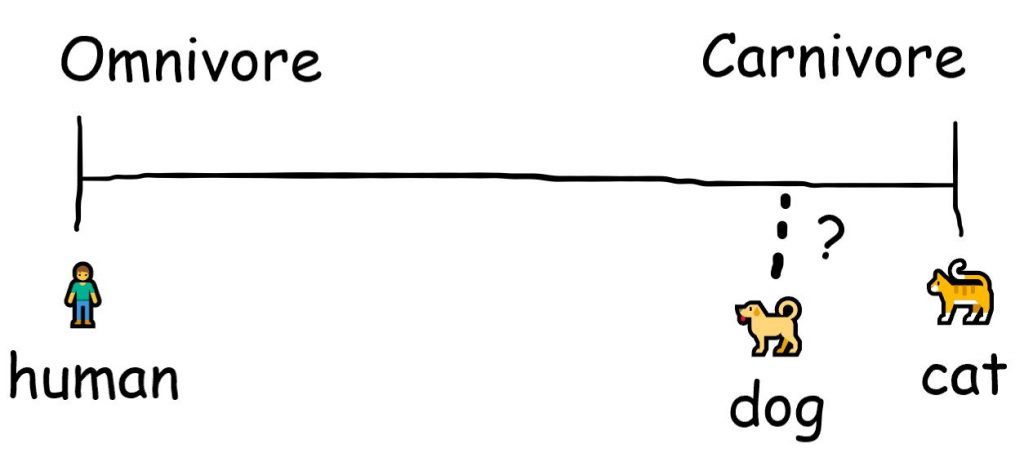
Were you thinking the same..?
You may have noted the farmyard photo at the top of the page. If you didn’t, scroll up and take a look before coming back down here. Does it strike you as odd why the dogs are ripping apart that meat instead of eating the grass? Nope, probably not – dogs instinctively eat meat and we know it.
So what do you think? There’s still a fair bit more to this article, but if you’re about to head off for a surf then before you go let us know your thoughts in the comments below – Is a dog a carnivore or an omnivore?
Did you know a major factor in the “is a dog a carnivore or omnivore” debate is Mars, Nestle, and Colgate-Palmolive (yep, chocolate bar and shampoo companies)?
Sit tight, things will get a little bit more controversial from now on…
The influence of pet food marketing on the carnivore vs omnivore debate
Do you have a tin foil hat? Put it on…
It can never be underestimated how much influence pet food manufacturers have on a fundamental question such as whether a dog is a carnivore or omnivore. A dog food can be made from meat (expensive) or grains (very cheap), and the profit margin of the latter is the #1 reason almost every pet food on the market is made mostly from grains. If they’re not from grains they’re made from potatoes, tapioca, peas, or some other non-meat ingredient – anything but meat (read our reviews if you don’t believe me).
Most leading brands of pet foods are made by the same three incredibly powerful conglomerates – Mars, Nestle, and Colgate-Palmolive. Pedigree, Optimum, Royal Canin, Hill’s, Purina, My Dog, and so many others are brand names from these three conglomerates. I can stand in a pet food aisle in the supermarket and name every manufacturer, and it reads like “Mars, Nestle, Mars, Mars, Nestle”, and in your local veterinary practice it would be “Mars, Colgate-Palmolive”.
These conglomerates have created a very well oiled and extremely lucrative marketing machine, and they feed consumers whatever information they desire, for profit, and not necessarily your pet. It is, after all, just business…
If you don’t believe pet food manufacturers feed us whatever spin they want us to believe, then here’s a snippet from Google when you search for “Are dogs a carnivore or omnivore?”:
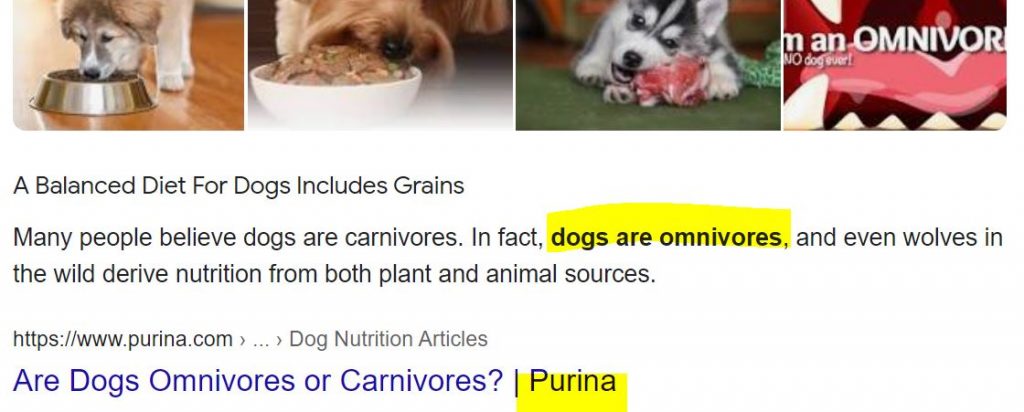
Even the statement “A Balanced Diet For Dogs Includes Grains” in the above image is dubious marketing.
It’s not just Nestle Purina, it’s Colgate-Palmolive Hill’s, Mars Advance, Optimum, My Dog… they’re all well and truly in the “dog is an omnivore” camp, irrespective of their teeth, digestive system, ancestry, or clear-as-day behavioural traits.
How odd is that?
Well, odd, but perhaps not surprising from companies who sell “corn for cats”.
Not only do these conglomerates have a crazy amount of money to influence us as consumers, they likely own your local veterinary practice too.
It’s also likely your vet studied coursework provided to the university by those conglomerates, and learned in their final year of vet studies that Condition X requires a specific diet of Y, and Scientific Brand Z is formulated for this condition. They were possibly even taught by a lecturer on the payroll of one of those conglomerates.
Conflict of interest?
In the case of Mars, there’s even Mars Pet Care University which vets can study from. Universities need money, right, and pet food manufacturers are ready and willing to offer large sums of money in sponsorship. As I mentioned earlier, it’s just business.
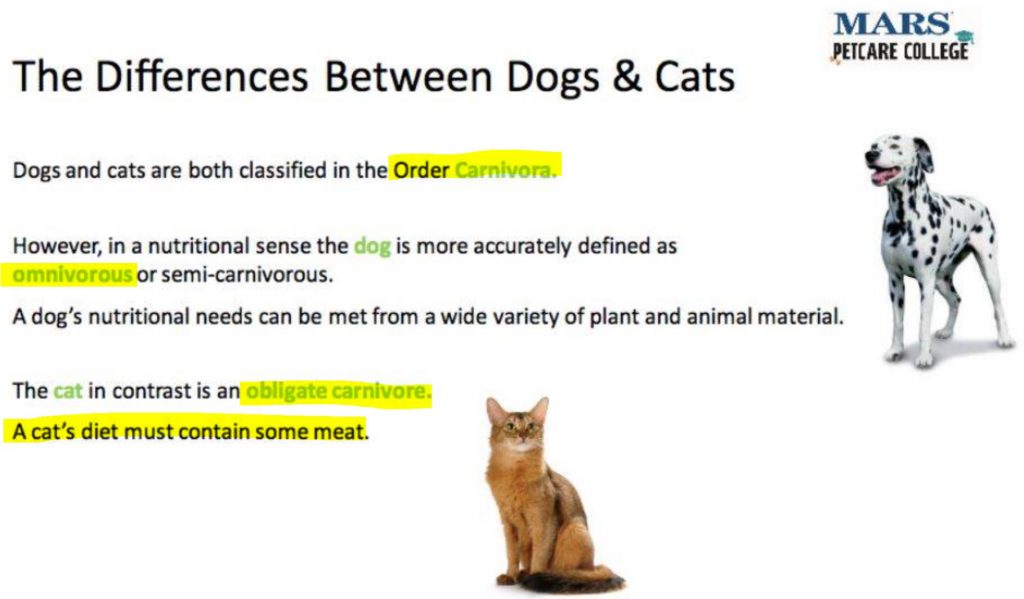
Oh, and if your veterinary practice isn’t owned by a pet food manufacturer, it will probably be owned by a pet food retailer.
An infographic for you to share – how to decide if your dog is a carnivore or omnivore?
Right, I have a favour to ask. Putting together the reviews on this website takes me forever and a day. I rely on you guys as readers to get the word out, either by sharing or verbally telling people. In this instance I made something arty for you to share, use on your website (with a reference), or stick on the wall of your pet shop or veterinary practice.
Here you go, “Is Your Dog a Carnivore or Omnivore – The Definitive Test“
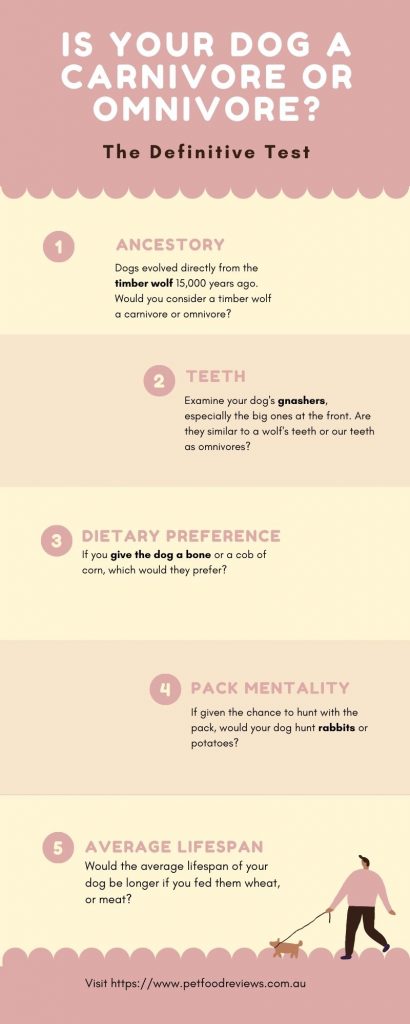
A carnivore vs omnivore FAQ
Obviously the carnivore vs omnivore debate is far from simple, and evidence suggests many non-meat ingredients can be of benefit to a dog (we discuss these in all our reviews), but here’s a few frequently asked questions with a no-nonsense answer:
How are dogs classified biologically?
Dogs are classified as order Carnivora, derived from Latin as carō (meaning “flesh”) and vorāre (meaning “to devour”). Placental mammals belonging to the order Carnivora are defined by their diet primarily of flesh.
What carnivorous characteristics does a dog have?
The dental structure, digest system, and behaviour of a dog are inline with a carnivore. The intestine of a dog is slightly longer than a cat as an obligate carnivore, but with a smaller girth than a cat the volume of the intestine is more similar to a cat than a human. The dental structure of a dog facilitates ripping and chewing of prey, and gnawing of bone.
What omnivorous characteristics does a dog have?
Dogs differ from their wolf ancestors with three genes which facilitate the digestion of non-meat ingredients inclusive of grain and vegetation. As scavengers they are often observed to eat non-meat foodstuffs if their environment offers little in terms of meat or prey.
Can dogs survive without meat?
The answer to this is yes. There are numerous dogs across the world on a vegan diet, and some within that population have lived to a reasonable age. This is possibly due to a diet which correctly caters for all required nutrition otherwise provided by a meat-based diet. It is alleged a Border Collie by the name of Brumble lived to over 25 (or 189 in dog years).
Do dogs have a similar coefficient of fermentation to a cat?
The length of intestines in a dog are generally longer than that of a cat, but as the intestines of a cat have a wider girth it is perceived the volume may be relatively similar. This suggests a dog is closer to it’s domestic carnivore counterpart than that of an omnivore.
Are dogs carnivore or omnivore?
Being of the order Carnivora, dogs are considered primarily flesh-eating placental mammals. They differ from their Timber Wolf ancestors by having three genes which aid digestion of grains and vegetable matter, and due to their ability to scavenge and eat non-meat foodstuffs are often considered omnivore. Their anatomy however is not dissimilar to cats as obligate carnivores, and facultative carnivore is more apt (a carnivore which will also eat non-meat ingredients in addition to animal food).
A final summary
Our reviews have a great deal of emphasis on a cat being an obligate carnivore and a dog being, well, pretty much a carnivore as well. This is in stark contrast to pet food companies who decade after decade pump out brand after brand of grain or potato-based dog and cat foods. Unfortunately the big pet food players also control most of the science around pet nutrition, and they’re very reluctant to release any science which hurts their almighty profit margins.
But if you find yourself wondering if pet food manufacturers and their reams of research are right, then ask yourself this – why do they market their grain or potato-based pet foods as meat, with succulent chicken or lamb in mouth-watering imagery on the front of every bag?
The purpose of the reviews on this website are to offer simple undisputable logical facts and hopefully trigger a thought process.
To end this dog carnivore omnivore rambling, I’d like to say thank you for reading, I hope it’s been an interesting read, and if it has…. please tell others, share the infographic, and read our reviews!
If you’re still confused with whether a dog is an omnivore or carnivore, then perhaps consider them a facultative carnivore – an animal which is essentially a carnivore, with a primary focus on a prey diet, but may also eat non-meat foods. Makes sense, right?
:offers:
We hope you’ve enjoyed this article. Are dogs carnivores or omnivores?




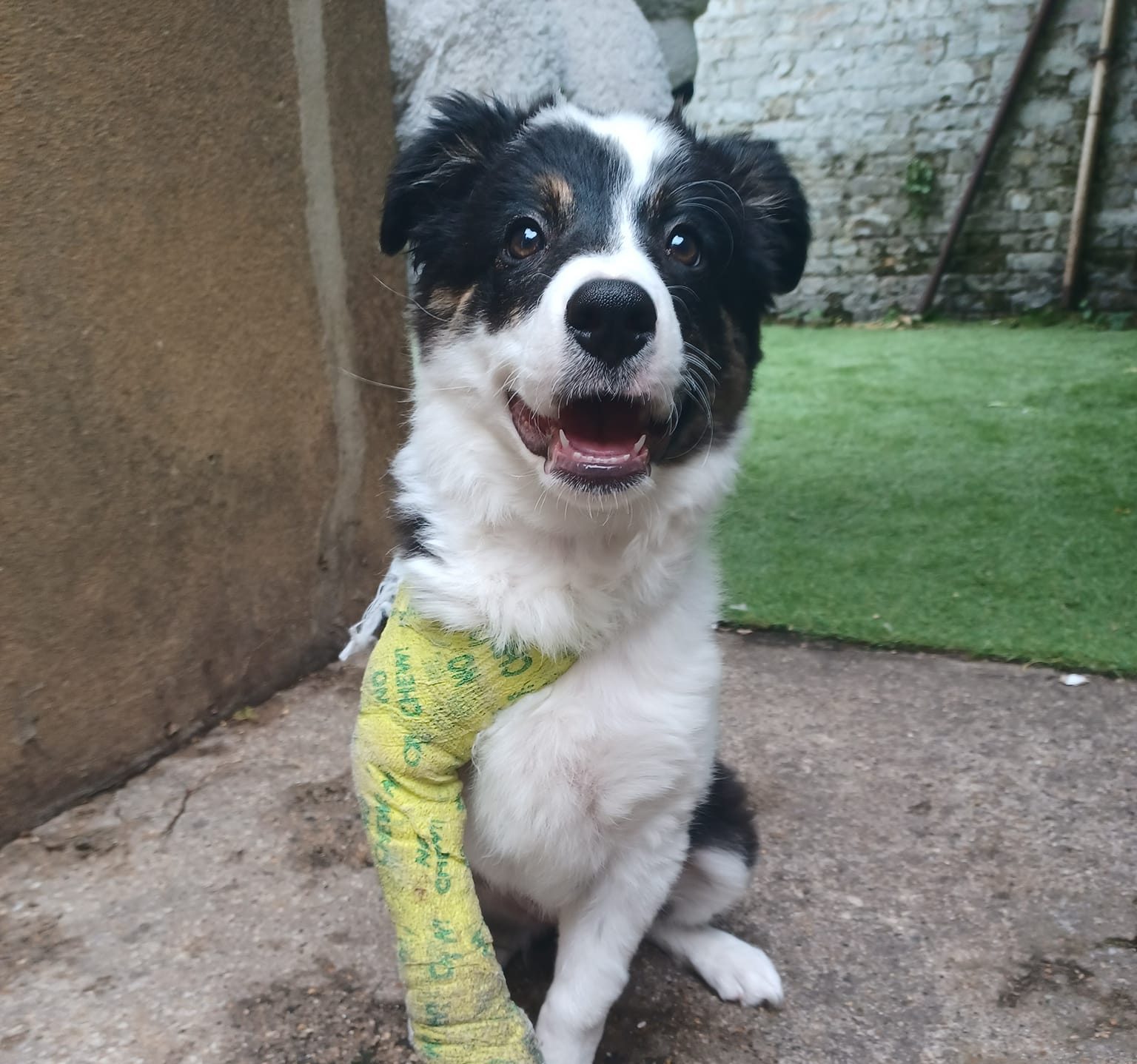
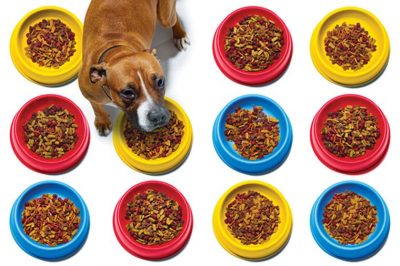

I would love to see a ‘recent reviews’ tab on this website. There is one for recent comments, but I can’t find an obvious way of reading your recent reviews. I usually just stumble on them by accident.
Hi Annabel, good idea – I’ll add one shortly.
Given that dogs are primarily carnivores, why is it that commercial foods using legumes as fillers are deemed better than grain based foods? I’m confused as to why legumes are considered a better alternative and having difficulty deciding on the best diet for my 2 dogs. There seems to be some evidence that legumes can inhibit the absorption of some essential nutrients and whilst this may not yet be proven I’m not sure I want to risk it. It’s very hard to source a commercial food without one or the other included.
Hi Pat, you find so many arguments for and against grain or grain-free, but the real issue as I see it is lack of animal ingredients – the stuff your dog really needs.
All commercial pet foods exist to make a profit, otherwise they wouldn’t exist. Animal ingredients are expensive, grain or grain-free inclusions are cheap in comparison. That’s why pet foods push as much non animal ingredients into a product they can get away with. A common formula will be minimal meat, minimal animal fat, minimum required nutrients (often as a vitamin mineral mix), and then bulk the rest up with whatever they can get away with. Given it can take many years for the health of a dog to deteriorate, or diet-related conditions such as heart or kidney disease, diabetes et al to develop, they generally do get away with it.
Science and research in pet nutrition is rather skewed, especially when you consider the role marketing departments play in it. Pet food is manufactured by some of the most influential conglomerates in the world. This is why we feed hard nuggets of grain (or grain free alternatives) to animals which are factually obligate carnivore like cats, and believe this is both right and scientific. It doesn’t take much to realise this isn’t right for our cats, so why should it be right for our dogs?
Hi. Thanks for your response. Firstly I would like to congratulate you on a really informative website. Stumbling on your website set me on my (very confusing) journey to improve my dogs diet. Previously I naively thought kibble was an acceptable form of nutrition. My labrador, unsurprisingly, has adapted to a new diet of TOTW and varying additions such as eggs, sardines, some raw meat and cooked veggies from a previous diet of solely Advance kibble. My problem is my 10 month old cavoodle. She was doing ok on Royal Canin mini puppy kibble. On reading your reviews I changed her to Ziwi peak canned food for breakfast and frontier for dinner. I have since been battling with loose motions and trying to figure out the problem. Stopping the ziwi peak wet food hasn’t really helped although I suspected the chickpeas were the problem. I am persevering with frontier chicken (the pork made both the labrador and cavoodle vomit) but added some white rice in the hope that solidifies her motions. I have resisted going back to a kibble diet but it is very frustrating!
Hi Pat, loose bowels are common when a dog changes diet, particularly when the previous diet was fed solely over a long period of time. Dogs can develop intolerances like we can when we don’t eat certain foods over a long time, which causes diarrhea when those foods are reintroduced – whether healthy or not.
Sometimes adding pumpkin or similar to their diet can help you through this phase while their guts adapt to the difference in diet.
Good luck!
Great article.
I actually believe dogs have 2 common ancestors. The wolf and the greyhound. That is to say, the greyhound does not come from the wolf.
I’m not sure where foxes fit into the equation, but when a fox kills a lamb, it will eat the tongue and the internal organs first. They don’t often eat the muscle. And if you give a dog a couple of raw chops, it will most likely bury them for a few days to let them ‘cook’ a bit. (Unless there is another dog around).
My greyhounds love whole raw chicken, bones, fat and all. Pretty sure they wouldn’t go for feet and beaks, which the pet food companies would call ‘poultry and poultry by product’
But as with us humans, basically anything that is processed is not food, it is product.
The words ‘food’ and ‘industry’ should never go together.
I have three issues with this article. First of all, the dog is not a descendent of the timber (grey) wolf. Dogs and Grey Wolves descended independently from a common ancestor (another kind of wolf, now extinct) probably a lot longer than 15 000 years ago. Therefore, the eating preferences of the timber wolf are not very relevant. Secondly, when a carnivore kills, the first thing it does is eat the stomach contents. Given that most prey is herbivore, grazing animals eating grass and grain, what do you think these carnivores are eating? Finally, given that the domestication of the dog occurred 20-30 000 years ago, there has been plenty of time for their diet to diversify. Those dogs that could adapt to the human diet were more likely to survive and pass on their traits.
Hi Joe, I’m happy to accept your point about Dogs and Grey Wolves.
Regarding stomach contents however, this is definitely not established fact. As a simple example, when a predator kills prey they won’t eat stomach contents first for obvious reasons.
There’s a lot of research which suggests otherwise. I’ll use the word “suggests” as research can “suggest” either way, and there are many variants.
This is what the NRC state:
“Thus, there appears to be no requirement for carbohydrate in dogs provided enough protein is given to supply the precursors for gluconeogenesis.” – Nutrient Requirements for Dogs and Cats.
AAFCO (2016):
“Dogs have no requirement for plant carbohydrate”
Nevertheless, the purpose of this article is to promote the line of thinking that “carnivore” and “omnivore” aren’t buckets of which an animal must only be put into one. Dogs have more similarities, in many ways, to cats as carnivores, than they do to us as omnivores. There will always be many ways to label a dog as one or the other, so it’s a case of coming to a logical conclusion yourself.
Pet food manufacturers will always, of course, find ways to justify keeping the costs of ingredients to a minimum, and labelling a dog as an omnivore does just that.
Is there any good reason to feed your dog commercial pet food at all? Vs bones from the butcher, suitable leftovers, and whatever ever else your dog might enjoy (that’s not obviously harmful)?
Hi Dylan, it really is a good question. A couple of weeks ago a dog in Portugal broke the world record for oldest dog, and apparently he’s lived off table scraps his whole life.
From my experience one of the benefits of commercial pet food is it must contain all nutrients which “science” tells us are required for a pet to sustain life. i.e. “Complete & Balanced” based on AAFCO standards.
How nutritious any given commercial pet food is is open for debate :/
When it comes to not feeding a commercial pet food, the onus is on the pet owner to cover all nutritional requirements. The raw feeding trend led to many people feeding their pets a diet of beef mince (or similar) which can lead to all manner of deficiencies. Even pet owners who are more clued up can still miss vital nutrients, and it may take some time – even years – for any deficiencies to manifest into symptoms of a health condition.
Thankyou for this information. I agree with you totally. I will share this review.
This is a well written, logical and easily understood article. My own observation is that dogs are very much carnivores but will opportunistically eat non-meat food from time to time. The degree to which they do this seems to depend very much on the breed (or perhaps the individual). Our previous Labrador retrievers would gleefully gobble up a discarded apple core whilst our current kelpie x border collie has no interest in apples at all and seems to do very well on a “prey style” diet. We currently feed her ziwi peak but are looking for alternatives to “mix it up” a bit.
We are looking at trying a patty style frozen food called Proudi which appears to tick most of the boxes. Its similar to “Big Dog” but without the veggies.
Has Pet Food Reviews looked at Proudi before? Whilst not air or freeze dried, I guess it could be included in your “Alternative dog foods” section
Hi Neil, thanks for the feedback – appreciated. With your observation with your dogs being very much carnivores but will opportunistically eat non-meat food is the perfect description of a facultative carnivore, which is exactly what I would consider a dog.
I’ve fed Proudi and would recommend it. With barf patties I tend to differentiate quality based on (1) how much meat, and (2) whether they use human or pet grade ingredients. There’s a vast difference in quality between the two, and Proudi is all human grade, meat, offal and bone. The only issue I see with barf patties (but commercial pet foods in general) is they do little for dental health. The best option for that would be to feed appropriate raw bones as well.